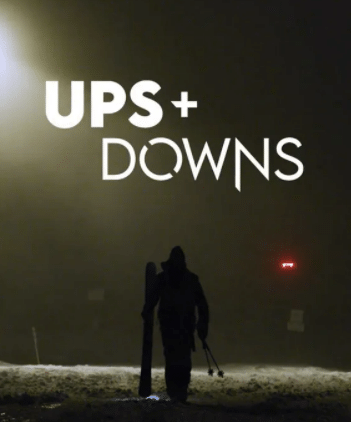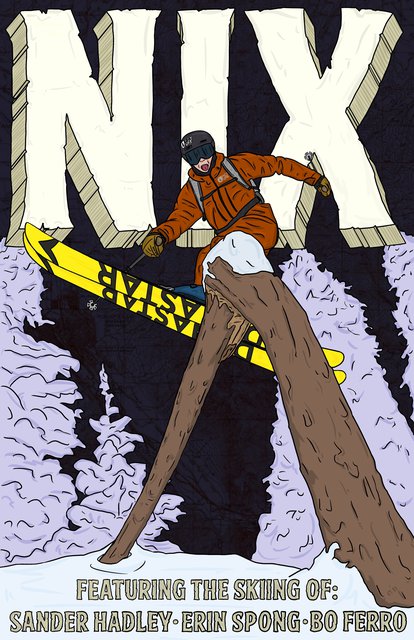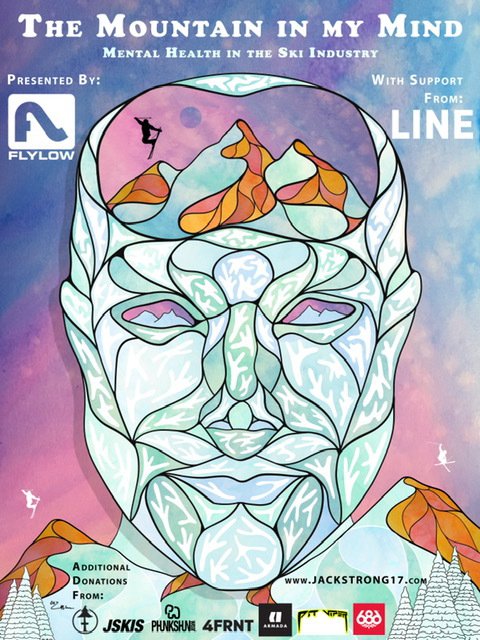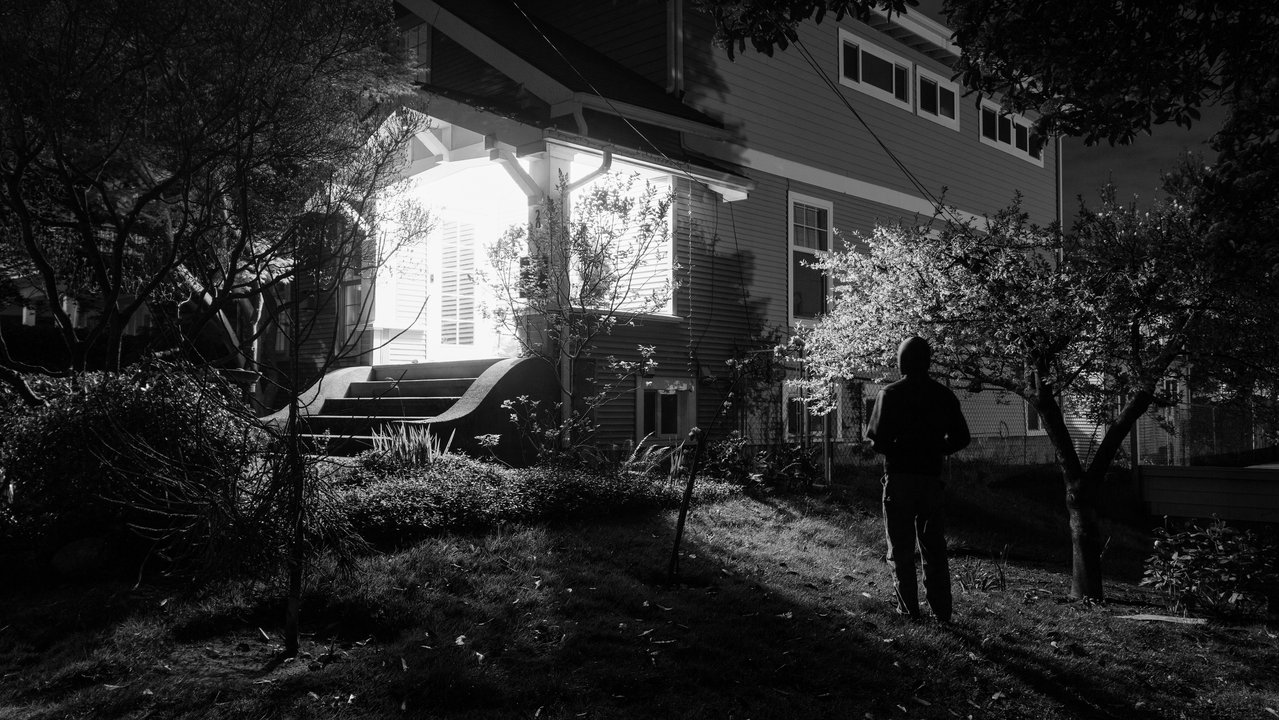The conversation around mental illness in the freeskiing community has been percolating for years. Alex Schlopy’s struggle with mental illness played out in a series of posts (some by Schlopy himself) on Newschoolers starting in 2016, and were chronicled officially by Powder in 2019 in an article that detailed his numerous suicide attempts. In an 2018 interview with The Inertia, Tanner Hall came forward to say that he was finally sober, after two previous attempts to quit drinking. Even Lindsey Vonn, who sits adjacent to the freeskiing community rather than within it, publicly detailed her struggles with the pressure to perform and depression at a Blue Cross Blue Shield forum in 2019. These stories, which displayed a surprising degree of vulnerability from athletes who exist as idols for endless ranks of young fans, suggested that perhaps the freeskiing community as a whole was neglecting to address a years-old issue. However, they also showed promise as instances where pro skiers took advantage of their massive platforms to encourage skiers worldwide to be honest and vulnerable about the pitfalls of our shared lifestyle.
And it’s not just pros who face the challenge of mental illness. The stories of the few who have come forward are parallel to the experiences of many average ski town community members throughout the US, and the rest of the world. Due to its high suicide rates the Rocky Mountain region holds the following grim title: the suicide belt. Montana, Colorado, Wyoming, Idaho, and Nevada, which are all located in the suicide belt, frequently place in the top ten states with the highest suicide rates. There are several potential (I say potential because quantifying something as nebulous as mental illness can be tricky) causative factors here. Recent research suggests a potential link between consistent high altitude exposure and rates of depression. Similarly, mountain towns are known for their rampant party cultures, a piece of common knowledge furthered by a 2017 research article published by Swedish researchers, that found that alcohol abuse and drug abuse were considerably higher in ski resort town employees in comparison with the general public. Other issues, like isolation, tentative housing situations, and darker winters, may contribute as well. Regardless of the root causes, though, the statistics demonstrate that inhabitants of resort towns are uniquely suffering.
Luckily, this fall, the momentum around the shared conversation of freeskiing and mental illness, particularly with those who have an established platform, seems to be building. A few weeks ago some friends and I went to the Wilma, a theatre located in downtown Missoula, to see Quality Ski Time, a movie tour sponsored by Salomon. The set opened with a film called Girl Crush, that was produced by Salomon rider Mali Noyres. The film centered on an all-women trip into the backcountry, and explored the importance of women having role models that are also women, which often aren’t easy to find in the male-dominated backcountry scene. After that film wrapped, Drew Peterson, another rider for Salomon, took the stage. He introduced his film and offered a content warning that went something like this, “in this film I discuss suicide and depression. If that’s triggering for you, feel free to leave at any time--do what you need to do''. I was a bit shocked. The only premier I’d attended prior to Quality Ski Time this fall was TGR’s latest flick, which was fun, but didn’t exactly make me think.

Image credit: Sweetgrass Productions
As Drew Peterson’s film Ups and Downs finished, I was left with the feeling that real headway was beginning to be made. Throughout the film he detailed his experiences with suicidal ideation, which was only compounded by a traumatic brain injury (post-injury depression is common with those who have suffered a TBI), and how these struggles complicated his perceived carefree lifestyle as a pro skier. The crowd was incredibly receptive and offered loud hoots of encouragement, and I didn’t overhear anyone deploying the oft used old school vernacular of male-dominated action sports spaces, like bitch, or weakling.
Peterson isn’t the only pro skier to adopt radical openness in their film production process this fall, either. Sander Hadley, who exploded onto the scene with his incredible POV edit The Way I See It, took a similar approach with his 2021 film, Nix. Unlike Ups and Downs, Nix isn’t a film specifically about mental illness, rather, it focuses on the struggles associated with pursuing the pro-skier lifestyle. In a series of interviews throughout the film Hadley tells his story, from first blowing up, to not skiing as well as he'd like while filming for a Matchstick Productions movie, and the challenges of losing his father to a heart attack.

Artwork credit: @cydwhit
(@cywhitling on Instagram)
I caught up with Hadley to hear more about his inspiration behind the creation of Nix. “Yeah, I guess I just get so tired of the self promotion of painting a false picture of life”, he said, and, “because, you know, social media has all the highlights of things. It should [instead] sort of show like, you know, not only is the skiing maybe relatable and there’s the ski area and stuff, but there's also a life story of, you know, people. People experience loss and go through hard times, and there's not really a guide on life, and you go through things and experience them. And I think more than anything, wanting to help people relate in going through struggles”.
“Yeah, totally. I think all too often people view professional athletes like superheroes. And you know, there's no chink in their armor. They're perfect. And every day is perfect. But in reality, there's a lot of things that drive these people to the extremes of, you know, accomplishing things in their sports, it's maybe not always the healthiest of things”.
This perspective mirrors the approach of Drew Peterson’s film Ups and Downs, and I asked Hadley if pro skiers, who are so often impenetrable idols for their droves of fans, have some sort of responsibility to show their audience that their lives aren’t always perfect: “Yeah, totally. I think all too often people view professional athletes like superheroes. And you know, there's no chink in their armor. They're perfect. And every day is perfect. But in reality, there's a lot of things that drive these people to the extremes of, you know, accomplishing things in their sports, it's maybe not always the healthiest of things”, he said, in response.
Hadley expanded on his thoughts in a small written statement he sent to me after our conversation, “skiing has forever felt like a selfish pursuit. I wanted to try and figure out a way for it to benefit more than just me. If there is any job description of what a professional skier should be, it is to be inspiring to people, whatever that means to people”, he wrote. Nix was the result of this ethos, a project that recognizes inspiration doesn’t just come from badass skiing, and that it doesn’t just have to inspire it’s audience to ski hard, it can also inspire them to open up.
The misinformed notion that the lifestyle of the skier is perfect was echoed by my next contact, John Padilla, who is a lifelong skier and advocate for those who suffer from mental illness. Padilla, who’s interest in mental health advocacy began in 2019, when he lost his little brother to suicide, explained to me the psychologly prinicple dubbed the ‘paradise paradox’, which is the idea that having a perceived fantastic life, like living in a ski town, only compounds mental illnessess when they arise: “we look like we live this just perfect lifestyle where you have all this opportunity and this beauty that surrounds you. But also you're isolated in that it's usually harder to find a therapist, there's not as many therapists in these smaller ski communities”.
“They [pro skiers] were all just afraid that if they ever came out and said something that they wouldn't be seen as an idol anymore, or is like this perfect person with all these kids who look up to them”.
For Padilla, the framework of the ‘paradise paradox’ extends to pro skiers, “they [pro skiers] were all just afraid that if they ever came out and said something that they wouldn't be seen as an idol anymore, or is like this perfect person with all these kids who look up to them”. His comment highlights the importance and vulnerability of Hadley’s and Peterson’s film projects. It’s not easy to admit that you’re struggling when you’re sitting on top of what everyone perceives to be the peak of the sport.
Padilla’s advocacy work for the coming season is focused on a film project titled The Mountain in my Mind, which will operate under the banner of his advocacy non-profit, Jackstrong17.The project is centered on a road trip that will take the film crew to over 10 resorts throughout the US and Canada, including Whistler, Tahoe, and Mt. Hood. Along the road Padilla aims to interview and film skiers, to hear their stories and give them a chance to play in their backyards on film. The interview subjects are slated to include pros and average locals. Padilla described the process like so, “[Interview] these kinds of industry leaders, these people that kids look up to. And then also just people that kids can identify with, just normal skiers, and overlay their words of their life mental health story over some skiing”. To support the project Padilla has partnered with several brands who have kindly donated gear for raffles, which includes several pairs of skis, outerwear/clothing from Flylow and Phunkshun, and gift cards from 686, “just a shit ton of stuff we’re going to raffle off here in a couple weeks [to raise funds for the film project]”, Padilla told me.

Artwork credit: @Liam_j10
(@oozblue on Instagram)
Padilla also referenced my suspicion that there’s a growing momentum around the destigmatization of mental illness in the freeskiing community. To him, momentum is key, “in mental health work, we talk a lot about momentum. When you catch traction like that, you gotta take it and run with it as fast and as far as you can. And I definitely agree with you, the pros who have started to come forward, the goal of this project is to get more to come forward”.
The end goal for The Mountain in my Mind is the promotion of destigmatization. For the pros among us, that’s the understanding that you won’t sacrifice your career by coming forward and being honest about your personal mental health battles, or other personal struggles. For the more average folks, it’s conversation. Whether it’s on the skin track, at the bar, or on the chair, Padilla hopes his film project will promote more honesty amongst skiing peers, with the increased prevalence of questions like “how are you today?” (and really mean it), rather than the impersonal “how’s your skiing today?”.
Padilla himself subscribes to this degree of openness. With little prompting he described his own struggles with depression, and explained his preferred method of treatment, therapy and medication. “I see a therapist regularly and take medication, and I’m super open about it. Anyone that asks like, yeah, dude, like, this is what happened. Here's how I deal with it”, he explained to me.
As we walked out of the Wilma after watching the rest of the films shown for the Quality Ski Time tour, we followed Padilla’s advice, and had a conversation. It was winding, first steeped in surprise that Drew Peterson was brave enough to go up on stage and bear his soul, and then gratitude. I, too, have faced down years of difficult-to-treat depression, and have found that in the past it often became painfully woven into my favorite past-time, skiing. To see a professional illuminate his struggles with depression and skiing was affirming for me, as I’m sure it will be for others. I unfortunately couldn’t get in touch with Peterson to thank him personally, but I like to imagine that next time I check on my friends, whether it’s on the hill, or off, it’ll serve as its own little cosmic thanks.
For more info about John Padilla's film project, and to read news about his non-profit: https://jackstrong17.com/


Comments